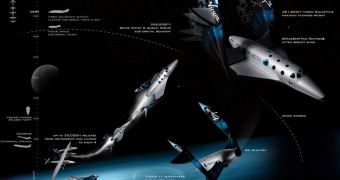While the very concept of a private space industry was considered to be unfeasible just a few years ago, recent developments have proven that the idea is totally false. Experts are now expecting to see private companies building more and more spacecraft, and 2011 promises to be an excellent year in this regard.
Throughout 2010, a number of innovations and firsts have made this industry stand out and develop, and has also forced national space agencies and governments to reconsider their official positions.
NASA got the hang of things first, followed by the European Space Agency (ESA). Both are currently fostering programs that will see the development of private spacecrafts capable of conducting both orbital and suborbital flights.
There are currently two main reasons for companies to get involved in this field – either to enter the blooming space tourism industry, or to produce spacecraft that can go up to the International Space Station (ISS).
Some corporations want to go beyond, and start their own space stations, that would not operate as science labs, but rather as hotels, capable of housing several guests at the same time.
Undoubtedly, the industry is still in its infancy, in the sense that the first private rockets have just been launched. Hawthorne, California-based Space Exploration Technologies (SpaceX) is leading the way.
It already sent the Falcon 9 rocket on its maiden flight in June, and has proven the worth of its Dragon unmanned space capsule this December, during the second Falcon 9 flight. Other companies are following in its footsteps already.
This year also saw the first glide test of the first suborbital spaceliner, the SpaceShipTwo. Developed by Virgin Galactic, the craft can take up to 6 passengers to the edge of space, for 3 to 4 minutes of weightlessness.
“The space industry has never seen such a rich and varied commercial landscape. New markets are emerging and established ones are changing,” explains Carissa Bryce Christensen.
She is a managing partner at the Alexandria, Virginia-based consulting firm The Tauri Group. The expert says that even large, established firms are changing their policies in response to the situation.
“The successes and setbacks of 2011 are going to make it the most interesting year in the history of commercial space,” Christensen predicts, quoted by Space.
“The key will be to systematically move forward, building success upon success. I believe the coming year will reward patience, achievable goals, business fundamentals, reasonable business risks and a safety mindset,” adds the founder and host of The Space Show, David Livingston.

 14 DAY TRIAL //
14 DAY TRIAL //